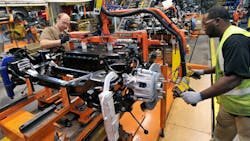Overall US Job Gain Masks Manufacturing Slide
The U.S. economy added 195,000 net jobs in June, a better-than-expected showing. But a gloomy sidenote dampened the overall employment gain: The manufacturing sector shrunk for the fourth straight month, shedding 6,000 jobs.
“The economy is producing jobs, but they are, generally speaking, lousy ones,” said Scott Paul, president of the Alliance for American Manufacturing. “Goods-producing, family-supporting industries like manufacturing are falling behind.”
According to the Bureau of Labor Statistics’ monthly Employment Situation Summary, durable and nondurable goods suffered equal net losses of 3,000 jobs each. The individual manufacturing segments that experienced the largest declines were:
- Electrical equipment and appliances, down 3,300 jobs.
- Primary metals, down 2,800.
- Wood products, down 1,700.
- Nonmetallic mineral products, down 1,500.
On the positive side of the ledger, the two best-performing segments by far were transportation equipment, which gained 5,600 jobs; and motor vehicles and parts, which gained 5,100.
Chad Moutray, chief economist of the National Association of Manufacturers, noted that over the last 12 months the U.S. manufacturing sector has added just 29,000 new workers, which equates to 1.3% of the 2.3 million nonfarm jobs added during that period.
“Such a paltry rate of manufacturing job growth is a sign that we need pro-growth measures to boost the sector,” Moutray said.
Numbers Put Obama on the Spot
AAM President Scott Paul said the manufacturing job losses put the Obama administration in a tough spot since the president set a goal of creating 1 million new manufacturing jobs in his second term.
“That effort is off to a terrible start, and it won’t improve unless we change course on policy,” Paul said.
Paul said he advocates putting downward pressure on the U.S. trade deficit by aggressively enforcing trade laws and halting currency manipulation by Japan and China. He further recommends making major investments in infrastructure, innovation and the manufacturing workforce.
“America will only win by adopting high-road strategies such as these,” Paul said.
About the Author
Pete Fehrenbach
Pete Fehrenbach, Associate Editor
Focus: Workforce | Chemical & Energy Industries | IW Manufacturing Hall of Fame
Follow Pete on Twitter: @PFehrenbachIW
Associate editor Pete Fehrenbach covers strategies and best practices in manufacturing workforce, delivering information about compensation strategies, education and training, employee engagement and retention, and teamwork. He writes a blog about workforce issue called Team Play.
Pete also provides news and analysis about successful companies in the chemical and energy industries, including oil and gas, renewable and alternative.
In addition, Pete coordinates the IndustryWeek Manufacturing Hall of Fame, IW’s annual tribute to the most influential executives and thought leaders in U.S. manufacturing history.
